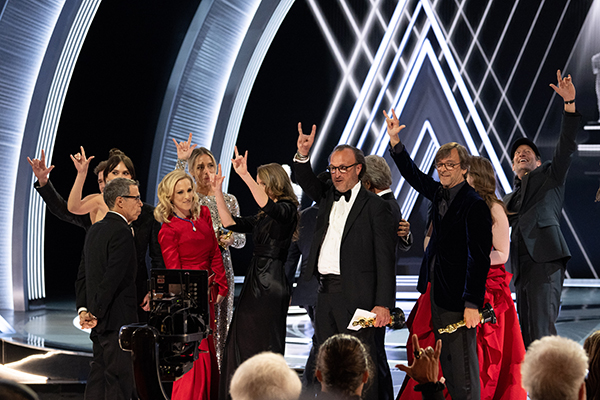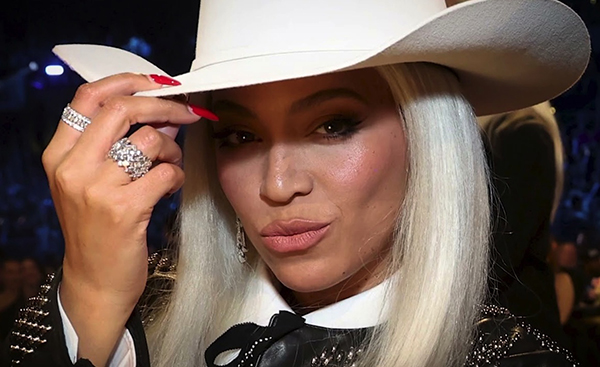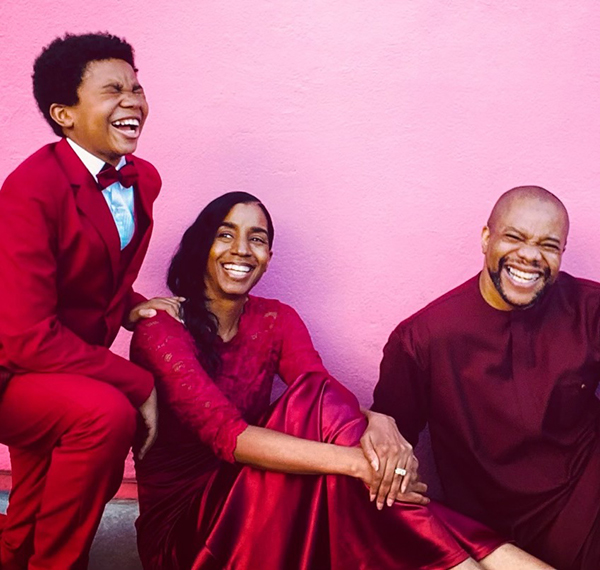Wave Wire Services
HOLLYWOOD — In an Academy Awards ceremony that will be remembered as much for Will Smith storming the stage and slapping presenter Chris Rock as it will be for Smith winning best actor honors later in the broadcast, “CODA” captured the big prize of best picture March 27 at the 94th Academy Awards show at the Dolby Theatre.
An emotional drama about the talented daughter of deaf parents deciding whether to pursue her singing-career dream or remain with the family fishing business, “CODA” won in all three categories in which it was nominated — also capturing trophies for best supporting actor, Troy Kotsur, and for best adapted screenplay, to Sian Heder.
Other major winners included Jessica Chastain for best actress in “The Eyes of Tammy Faye,” Smith for best actor in “King Richard,” Jane Campion for best director for “The Power of the Dog” and Ariana DeBose for best supporting actress for “West Side Story.”
The sci-fi epic “Dune” collected the most Oscars on the night — six — in largely technical categories, along with a win for best score for Hans Zimmer.
But the Smith-Rock confrontation overshadowed the evening’s winners.
Rock, while presenting the nominees for best documentary feature, made a joke about Smith’s wife, actress Jada Pinkett Smith — referencing her bald head and suggesting she would be starring in a “G.I. Jane” sequel.
Pinkett Smith has talked in the past about having a hair-loss condition, and Will Smith took offense to the remark.
After the joke, Smith walked onto the stage and smacked Rock in the face, in a move that initially drew laughs from the crowd — until it became obvious it was no joke.
Smith walked back to his seat, but screamed at Rock twice, telling him to “keep my wife’s name out of your [expletive] mouth.”
Later, in accepting the best actor award for his role as Venus and Serena Williams’ father in “King Richard,” an emotional Smith apologized — although not to Rock.
A year after COVID-19 forced the Academy Award ceremonies to be scaled back and relocated to downtown’s Union Station, these 94th Oscars returned to their traditional glittery script — once again at the Dolby Theatre, once again in a host format, and featuring a raft of presenters and performers that organizers hoped would boost the broadcast’s down-trending TV ratings.
The Oscars had been without a host for the past three years, but this year’s telecast on ABC featured three — Regina Hall, Amy Schumer and Wanda Sykes — each hosting an Oscar ceremony for the first time.
“This year the Oscars hired three women to host because it’s cheaper than hiring one man,” Schumer quipped during the show’s opening monologue.
The Academy also scored what it hoped would be a ratings-grabbing star, with Beyoncé among the musicians performing this year’s nominees for best original song.
In fact, Beyoncé opened the broadcast by performing “Be Alive,” which she co-wrote for “King Richard” — and her song was introduced by Venus and Serena Williams, characters in the movie that focused on their father, Richard.
The best song Oscar wound up going to Billie Eilish and her brother Finneas, who performed their song “No Time to Die,” the title track for the James Bond film of the same name.
The first Oscar awarded during the broadcast went to DeBose, for best supporting actress in “West Side Story” — making her the first openly queer woman of color to win an Academy Award.
“Imagine this little girl in the back seat of a white Ford Focus. Look into her eyes, you see an openly queer woman of color, an Afro-Latina who found her strength in life through art,” DeBose said, her voice shaking with emotion.
Kotsur’s best supporting actor award made him the first deaf man, and second deaf performer, to win an Academy Award. Marlee Matlin, his co-star in “CODA” — an acronym for “Child of Deaf Adult(s)” — won for best actress in 1987’s “Children of a Lesser God.”
Kotsur delivered his acceptance speech in sign language, with an offstage announcer narrating his words — and when he finished, many in the Dolby audience signed their applause by “clapping” silently, their hands making a waving motion but not coming together.
In accepting the best picture award, “CODA” producer Philippe Rousselet, surrounded by cast members and fellow producers, said, “Thank you to the Academy for letting our ‘CODA’ make history tonight.”
Campion, meanwhile, entered the evening having already made Oscar history as the first woman filmmaker to garner two best director nominations, following her 1994 nod for “The Piano.”
The New Zealander made some more history when she captured the best director trophy — becoming only the third woman to win the director’s prize after Chloé Zhao (“Nomadland”) last year and Kathryn Bigelow (“The Hurt Locker”) in 2010.
“The Power of the Dog” led the way this year with 12 Oscar nominations, but took home just Campion’s best director honor.
Chastain, who won her first Oscar following two earlier nominations, accepted her best actress award by saying, “Right now we are coming out of some difficult times that have filled with a lot of trauma and isolation. So many people out there feel hopelessness, and they feel alone.
“Suicide is a leading cause of death in the United States, it’s touched many families. It’s touched mine, and especially members of the LGBT community who oftentimes feel out place with their peers. We’re faced with discriminatory — and bigoted — legislation that is sweeping our country, with the only goal of further dividing us.
“There is violence and hate crimes being perpetuated on innocent civilians all over the world — and in times like this, I think of Tammy and I’m inspired by her radical acts of love. … And I’m inspired by her compassion,” Chastain added.
The ceremony featured two tributes to historic movie milestones — the 60th anniversary of the first James Bond picture, and the 50th anniversary of the first film in “The Godfather” trilogy.
“Godfather” director Francis Ford Coppola was joined on stage by actors Al Pacino and Robert De Niro. In brief remarks, Coppola acknowledged his “most extraordinary collaborators … many of them legends,” but singled out two — Mario Puzo, the late author of “The Godfather” novel, and the late Robert Evans, the former head of Paramount, who shepherded the movie to the screen.
Besides the Smith-Rock dust-up, the ceremonies featured another controversy, as the broadcast’s producers — looking to streamline the show — decided that eight awards would be presented prior to the actual telecast. Those categories were documentary short subject, film editing, makeup/hairstyling, original score, production design, animated short film, live action short film and sound.
The way it played out, those pre-show awards gave “Dune” four early wins — original score for Hans Zimmer; film editing for Joe Walker; production design for Patrice Vermette and Zsuzsanna Sipos; and sound for Mac Ruth, Mark Mangini, Theo Green, Doug Hemphill and Ron Bartlett.
Meanwhile, the award for best makeup and hairstyling went to “The Eyes of Tammy Faye,” while “The Queen of Basketball” won for best documentary short subject, “The Windshield Wiper” for best animated short film and “The Long Goodbye” for best live action short film.
Their presentations were edited and scattered throughout the telecast — but their exclusion from the live broadcast still brought criticism from the American Cinema Editors board of directors, among others — with the editors saying, “It sends a message that some creative disciplines are more vital than others. Nothing could be further from the truth and all who make movies know this.”
The Oscars’ push for a ratings rebound drove the decision, Academy President David Rubin had said.
Rubin noted that the ceremony is “a live event television show and we must prioritize the television audience to increase viewer engagement and keep the show vital, kinetic and relevant.”











